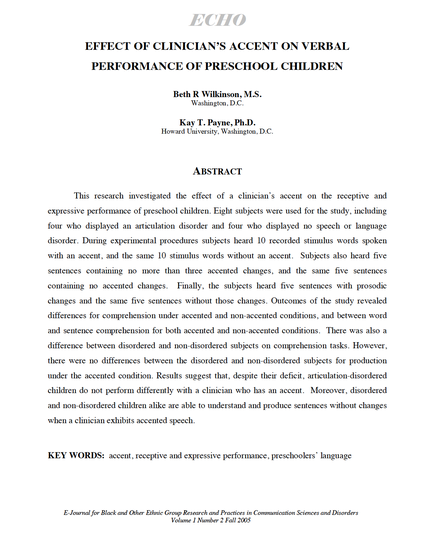
Article
EFFECT OF CLINICIAN’S ACCENT ON VERBAL PERFORMANCE OF PRESCHOOL CHILDREN
Echo
(2005)
Abstract
This research investigated the effect of a clinician’s accent on the receptive and
expressive performance of preschool children. Eight subjects were used for the study, including
four who displayed an articulation disorder and four who displayed no speech or language
disorder. During experimental procedures subjects heard 10 recorded stimulus words spoken
with an accent, and the same 10 stimulus words without an accent. Subjects also heard five
sentences containing no more than three accented changes, and the same five sentences
containing no accented changes. Finally, the subjects heard five sentences with prosodic
changes and the same five sentences without those changes. Outcomes of the study revealed
differences for comprehension under accented and non-accented conditions, and between word
and sentence comprehension for both accented and non-accented conditions. There was also a
difference between disordered and non-disordered subjects on comprehension tasks. However,
there were no differences between the disordered and non-disordered subjects for production
under the accented condition. Results suggest that, despite their deficit, articulation-disordered
children do not perform differently with a clinician who has an accent. Moreover, disordered
and non-disordered children alike are able to understand and produce sentences without changes
when a clinician exhibits accented speech.
Disciplines
Publication Date
Fall 2005
Citation Information
Kay Payne. "EFFECT OF CLINICIAN’S ACCENT ON VERBAL PERFORMANCE OF PRESCHOOL CHILDREN" Echo (2005) Available at: http://works.bepress.com/KayTPaynePhD/15/
